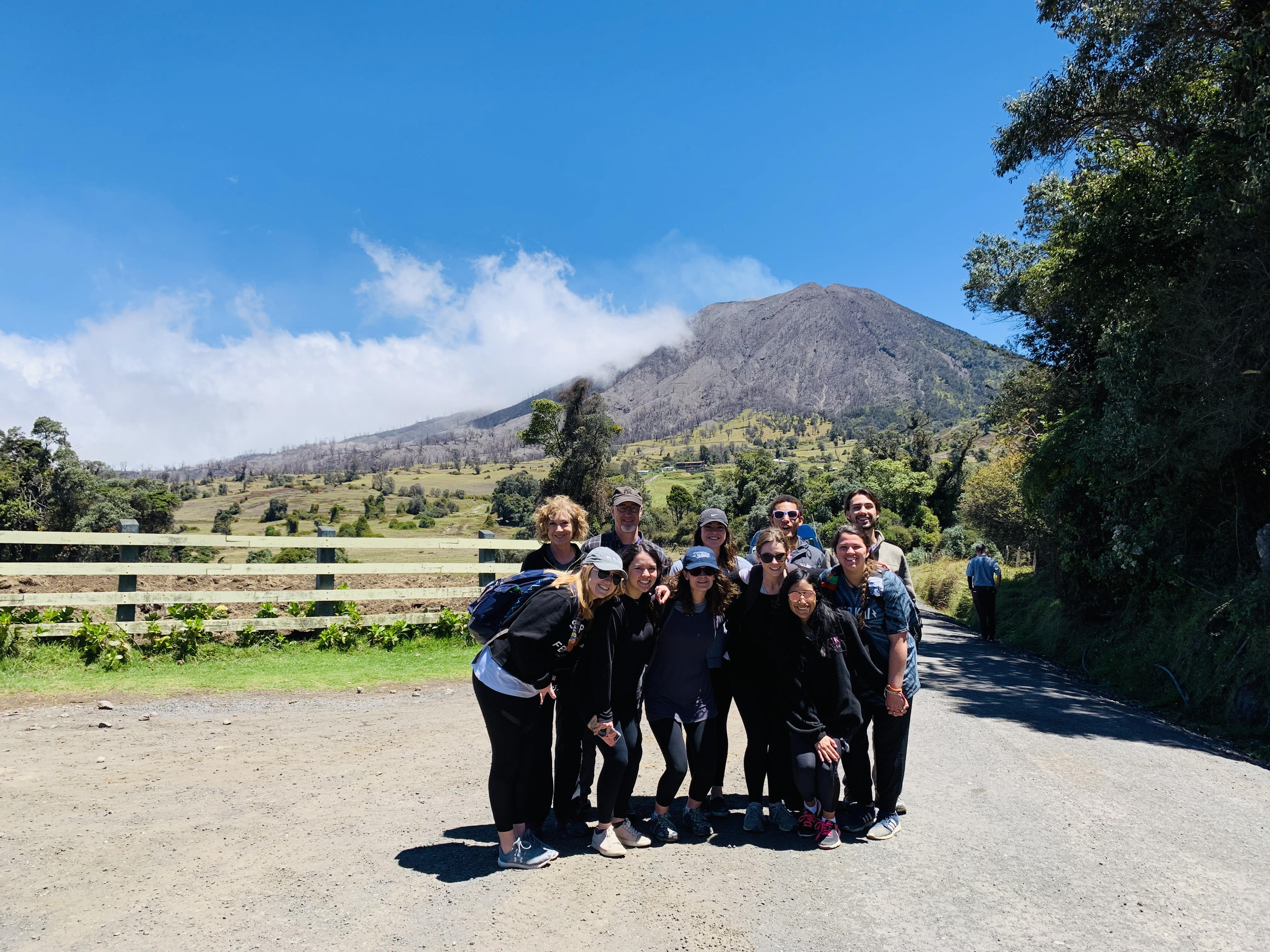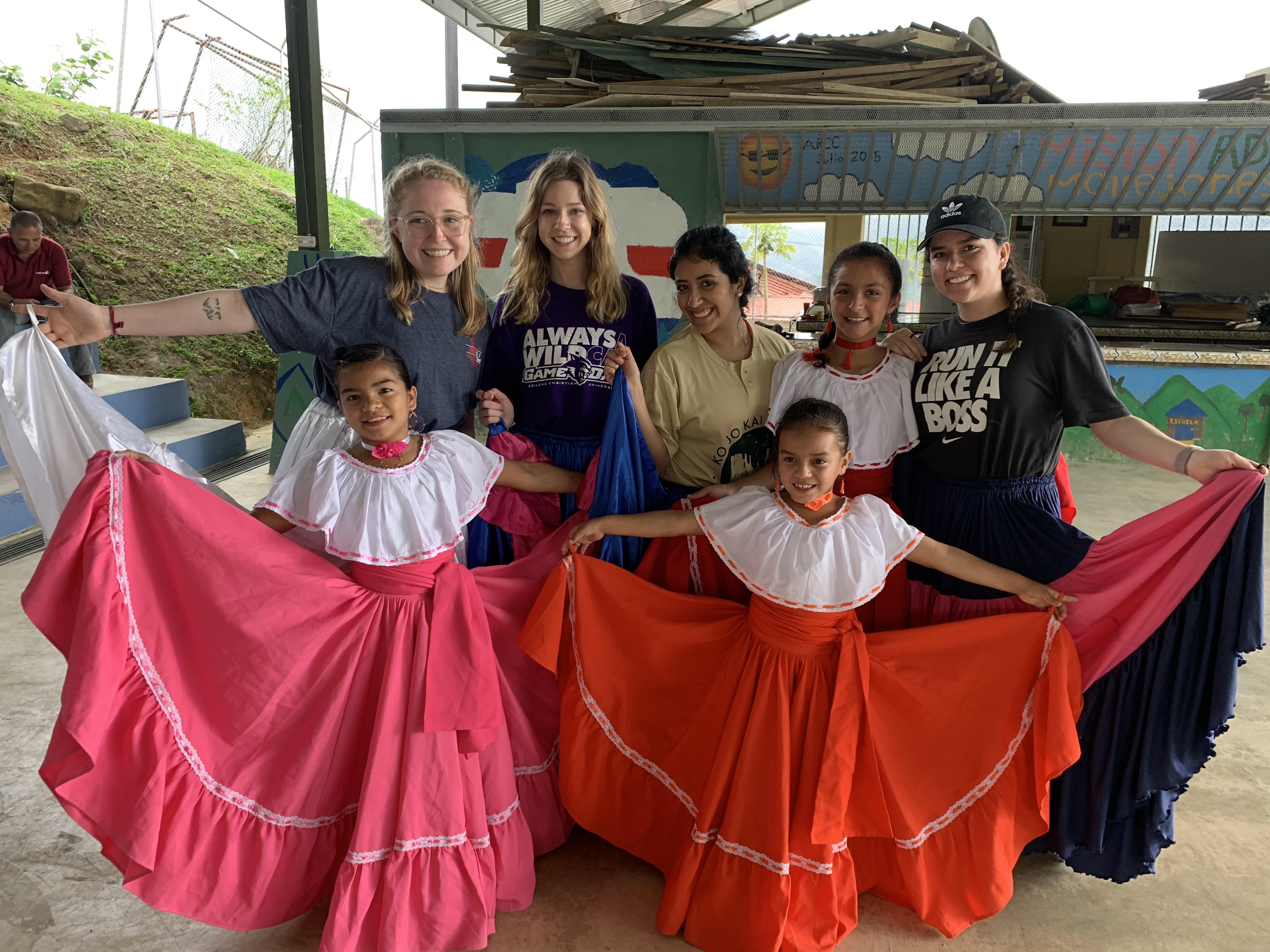 Over spring break, a group of students led by Dr. Laura Phillips and Dr. Sarah Easter traveled to Costa Rica for the first ever Social Enterprise Consulting (MGMT 440) class. This project-based course is designed to give students hands-on experience dealing with a real and substantial issue faced by a socially-minded organization. Students spent six weeks prior to spring break learning about the basics of consulting and learning about the cultural context of the country and organizations they would visit. They were challenged to complete research on the industry and market and received training from the Rotary International campus in Denton, who were also training the entrepreneurs in Costa Rica. “We wanted the students to be prepared in diverse capacities,” said Dr. Easter “That way, when we traveled to Costa Rica, they were as effective as possible in the one-week in-country visit.”
Over spring break, a group of students led by Dr. Laura Phillips and Dr. Sarah Easter traveled to Costa Rica for the first ever Social Enterprise Consulting (MGMT 440) class. This project-based course is designed to give students hands-on experience dealing with a real and substantial issue faced by a socially-minded organization. Students spent six weeks prior to spring break learning about the basics of consulting and learning about the cultural context of the country and organizations they would visit. They were challenged to complete research on the industry and market and received training from the Rotary International campus in Denton, who were also training the entrepreneurs in Costa Rica. “We wanted the students to be prepared in diverse capacities,” said Dr. Easter “That way, when we traveled to Costa Rica, they were as effective as possible in the one-week in-country visit.”
In Costa Rica, the class worked with the Centro Agronómico Tropical de Investigación y Enseñanza (CATIE), which is a regional center in Costa Rica dedicated to research and graduate education in agriculture, and the management, conservation and sustainable use of natural resources. In collaboration with CATIE, Red de Emprendedoras del Turismo Sostenible de Turrialba (RETUS) is a network of female entrepreneurs focused on experiential rural tourism offerings as a means to help provide sustainable livelihoods to the three involved communities in Central Costa Rica – Santa Cruz, Guavabo and Mollejones. CATIE and RETUS are interested in better understanding the US market for sustainable rural tourism in Costa Rica as well as the development of a promotional marketing plan to successfully reach identified markets in order to grow and develop RETUS further. The class stayed in a small town called Turrialba on the CATIE campus. Over the course of three days, they visited the three communities and observed experiential tourism offerings in each location.
The consulting nature of the course was focused on students engaging with the women entrepreneurs in terms of ecotourism, which means that tourists engage in local culture when on vacation rather than staying within the confines of a resort or hotel for the duration of their stay. Students evaluated the offerings of each entrepreneur from a US – and specifically Texas – tourist perspective. They spent time in each community taking detailed field notes and giving preliminary recommendations and then spent a full day with the class debriefing and identifying weaknesses and opportunities of the offerings in consideration of US customers.
 With the focus on ecotourism consulting, the students got to experience Costa Rica in special ways that emphasized interactions with the local culture. “The most eye-opening thing about this trip was the cultural immersion. To actively participate in activities with the locals gave me a unique perspective into who they are,” said Luke Stevens, a junior marketing major from Montgomery, TX. “Instead of feeling like an outsider looking in, I felt more like I was a part of them. Overall, I think I got more out of this trip because it had a focus and purpose as opposed to a regular spring break trip. I would rather have that type of experience than a relaxing week on the beach.” Among other things, the class toured the remains of a Pre-Colombian ruin, visited a butterfly farm, and even learned how to salsa dance. On their final day, they got to go zip lining through the jungle and rappel down waterfalls. “Since I come from a Central American country, I was really impressed by the ‘Tico culture,’ which is what Costa Ricans often call themselves, and how important it is to them that they grow as a community instead of as individuals,” noted Mafer Hernandez, a junior finance major from Guatemala City, Guatemala. They were also really invested in reducing contamination, their roads were clean and they also had several recycle bins.”
With the focus on ecotourism consulting, the students got to experience Costa Rica in special ways that emphasized interactions with the local culture. “The most eye-opening thing about this trip was the cultural immersion. To actively participate in activities with the locals gave me a unique perspective into who they are,” said Luke Stevens, a junior marketing major from Montgomery, TX. “Instead of feeling like an outsider looking in, I felt more like I was a part of them. Overall, I think I got more out of this trip because it had a focus and purpose as opposed to a regular spring break trip. I would rather have that type of experience than a relaxing week on the beach.” Among other things, the class toured the remains of a Pre-Colombian ruin, visited a butterfly farm, and even learned how to salsa dance. On their final day, they got to go zip lining through the jungle and rappel down waterfalls. “Since I come from a Central American country, I was really impressed by the ‘Tico culture,’ which is what Costa Ricans often call themselves, and how important it is to them that they grow as a community instead of as individuals,” noted Mafer Hernandez, a junior finance major from Guatemala City, Guatemala. They were also really invested in reducing contamination, their roads were clean and they also had several recycle bins.”
 Now that they have returned from Costa Rica, students are working on a full report and marketing assessment that gives promotional and placement considerations for the women entrepreneurs. The project-based experience has been invaluable for students as they have gotten a chance to apply what they have been learning in class to real life – and in a meaningful, purpose-driven way. Dr. Easter’s favorite part of the trip was twofold; “I loved watching how passionate the women entrepreneurs are about their businesses and communities and how driven they were in their desire to share that passion with outsiders,” she said. “I also enjoyed watching the students in that international setting. It was neat seeing them interact with people in the community and dive into the experience fully. Traveling with students and watching how much they learn and grow in a short time frame is always incredible”
Now that they have returned from Costa Rica, students are working on a full report and marketing assessment that gives promotional and placement considerations for the women entrepreneurs. The project-based experience has been invaluable for students as they have gotten a chance to apply what they have been learning in class to real life – and in a meaningful, purpose-driven way. Dr. Easter’s favorite part of the trip was twofold; “I loved watching how passionate the women entrepreneurs are about their businesses and communities and how driven they were in their desire to share that passion with outsiders,” she said. “I also enjoyed watching the students in that international setting. It was neat seeing them interact with people in the community and dive into the experience fully. Traveling with students and watching how much they learn and grow in a short time frame is always incredible”
A grant from Southwest Airlines for plane tickets and scholarships from COBA, as well as the partnerships with Rotary International, CATIE, and RETUS made this trip possible and effective for the students and faculty that attended. We are extremely proud of our students for choosing to spend their spring break applying their business skills to serve others in a global context. We look forward to watching how this class grows in the future and other opportunities our students will have to affect change.